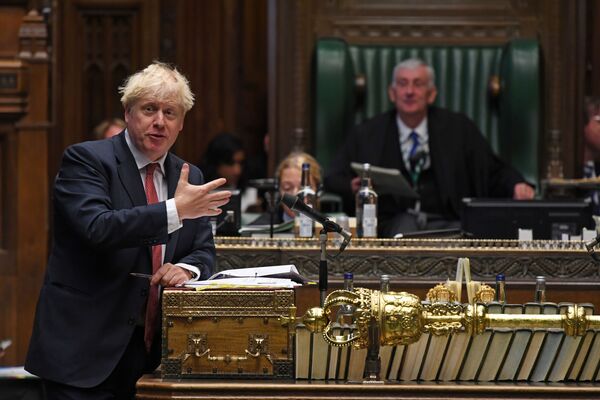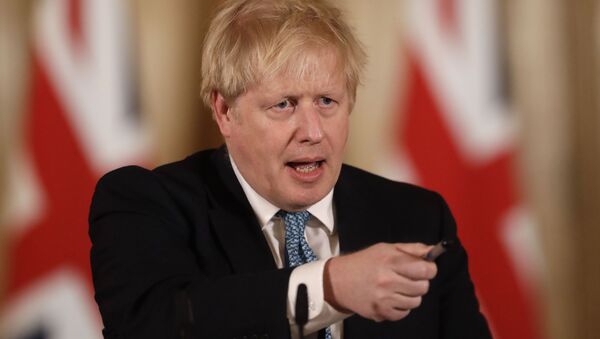Prime Minister Boris Johnson called upon Tory MPs to back the UK Internal Market (UKIM) Bill which will be formally considered on Monday. The bill is designed to ensure that there are no new barriers for business trading across the country after the end of the Brexit transition period.
Earlier, a dissent started brewing within Conservative ranks over the proposed legislation which, according to some, breaks international law, as it overrides parts of the already-signed Brexit Withdrawal Agreement and, specifically, the Northern Ireland Protocol, aimed at preventing a hard border returning to the island. There are reportedly up to 30 Tories in opposition to the bill in the House of Commons. In addition, Lord Howard of Lympne, the former Conservative Party leader, dropped a hint on Friday that the House of Lords may not approve Johnson's initiative.
Personal Defections But No Serious Split Among Tories
EU leadership has threatened Britain with legal action over the Internal Market Bill, and has not yet ruled out ditching any UK-EU trade deal if the legislation becomes effective.
"The EU has resolved to pursue the UK legally but Boris Johnson’s government has made it clear they don’t respect any law but their own, so unless his administration changes tack we are on course for a no-deal Brexit, which is what many Tory party supporters have wanted from the beginning", said Dr. Donnacha O'Beachain, associate professor at the School of Law and Government, at Dublin City University.
O'Beachain emphasized that for both parts of Ireland, "a no-deal Brexit would be very destabilizing, leading to a hard border, economic chaos, instability, job loss and a fundamental undermining of the peace process". He suggested that Scotland and Northern Ireland have repeatedly thrown the "virtues" of Brexit into doubt.
PM Johnson's Internal Market Bill is fraught with certain risks, O'Beachain warns, as this recent attempt to break the already-inked international pact may boomerang on the British, adding that the UK will face reputation damage that goes beyond trade if it passes the legislation.
"Why, for example, should the Spanish respect the Treaty of Utrecht that cedes control of Gibraltar?" he asked. "Why should the Chinese respect its agreements with the UK regarding Hong Kong if it does not suit? The British cannot take the high moral ground on matters of international law".
Nevertheless, the academic refutes the probability of any meaningful Tory dissent: "There may be some individual defections, but I don’t expect anything approaching a split", he observed.

What's at Stake for Johnson is UK Integrity
"To put things in perspective, I doubt that this will damage the UK's 'law-abiding' reputation as badly as prosecuting the Second Iraq War after the United Nations Security Council refused to authorise it", argued Dr. Roslyn Fuller, Canadian-Irish author, columnist, and director of the Dublin-based non-profit think tank, the Solonian Democracy Institute.
According to Fuller, "trying to grant oneself the right to derogate from trade regulations under certain circumstances seems positively quotidian."
What appears most disconcerting in the eyes of the author is that Secretary of State for Northern Ireland Brandon Lewis stood up in parliament and said that the new bill would break international law.
"Breaking treaty commitments or other forms of international law is not, unfortunately, terribly unusual, but casually admitting that you are doing so is", she said. "So either Lewis went completely off-script (he was a Remainer during the Brexit referendum campaign) or the Conservative Party is intentionally sending this message".
Fuller suggested that the Johnson government is "definitely willing to play hardball, as they did during the prorogation of parliament stand off last year".
"One of the factors behind this robust approach is likely the recognition that you can't burn a bridge that is already burnt", Fuller highlighted. "This government already incurred the wrath of the EU by leaving in the first place and this generation of EU officials is unlikely to ever forgive them for endangering the EU project. It would be completely naive to believe that at some point in the future the EU would refrain from undermining or harming this government, because they fondly remember how cooperative they were during Brexit".
Fuller drew attention to the fact that numerous prominent eurocrats have repeatedly expressed how warmly they would embrace Scotland if it breaks with the UK. For instance, in early February 2020, former European Council President Donald Tusk said on the BBC’s Andrew Marr Show that "everyone will be enthusiastic here in Brussels, and more generally in Europe" to welcome Scotland back in the EU when it wins its independence.
Given this sort of rhetoric, what is at stake for the UK is what could be national integrity and sovereignty, according to the columnist.
"Compared to the spectre of that happening, nothing else even counts as a political risk", Fuller underscored. "Therefore, it is unsurprising that the government is trying to gain more control over the situation in Northern Ireland, even if it comes at a cost".


